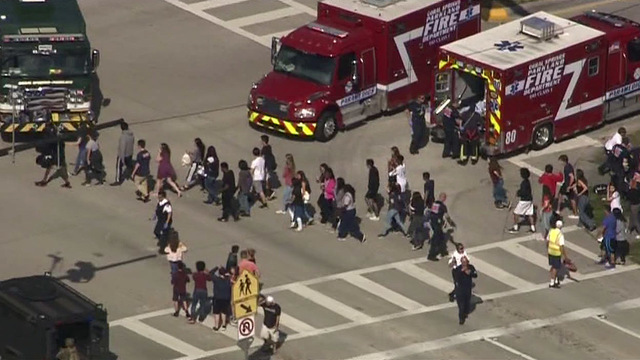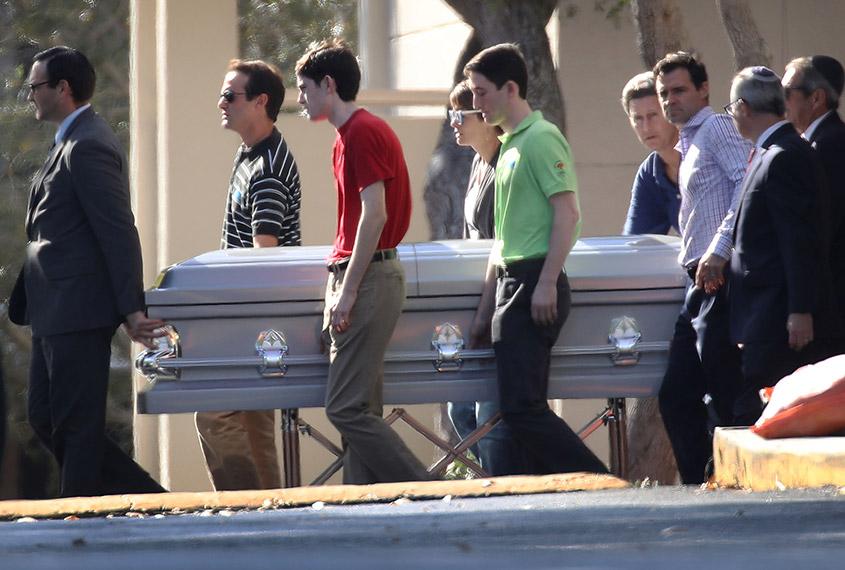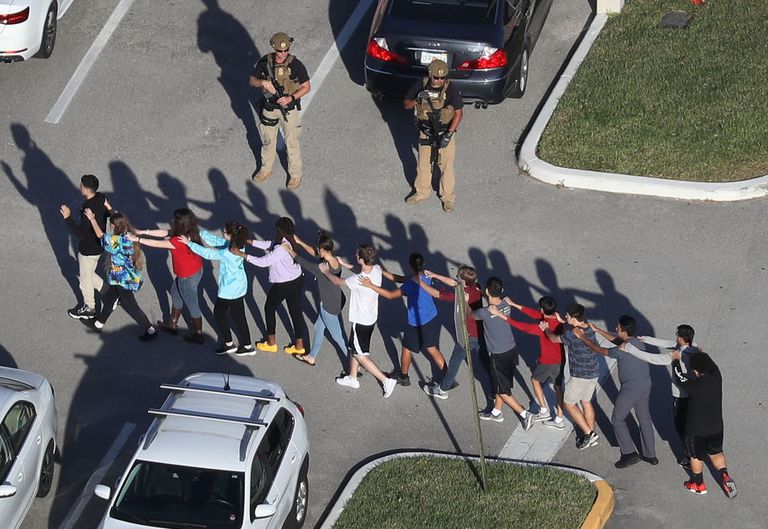On Feb. 14, 2018, gunshots rang out through Stoneman Douglas High School at approximately 2:21 p.m., shortly before the students within would be dismissed for the day. The result of the six minutes of terror on school grounds left 17 dead and 14 injured.
Nikolas Jacob Cruz, the perpetrator, is a 19 year-old former student of the school. His weapon of choice was an AR-15 semi-automatic rifle, the weapon that was used by the culprits of several other mass shootings. He is now in custody and may possibly receive the death penalty for 17 counts of premeditated murder.
Now, in the aftermath of the third deadliest school shooting in U.S. history, gun control debates have a new fire sparked beneath them. At the helm of the battle are survivors of this tragedy, students wanting to make a change in the laws that they believe have allowed friends and classmates to die a senseless and violent death.
 As of Feb. 23, there have been 17 reported school shootings in the U.S. this year. These are defined as “any time a firearm discharges a live round inside a school building or on a school campus or grounds,” by Everytown for Gun Safety, an advocacy group that keeps statistics on gun violence. This includes incidents where there were no injuries or deaths. The total amount of deaths in 2018 school shootings thus far is 23.
As of Feb. 23, there have been 17 reported school shootings in the U.S. this year. These are defined as “any time a firearm discharges a live round inside a school building or on a school campus or grounds,” by Everytown for Gun Safety, an advocacy group that keeps statistics on gun violence. This includes incidents where there were no injuries or deaths. The total amount of deaths in 2018 school shootings thus far is 23.
The shooting has created conversation about gun control in a personal level and in the government. Many have made their arguments on several social media platforms, such as Facebook and Twitter.
These arguments cover a spectrum of topics. These include things such as more strict gun control laws, more in-depth background checks and some people opting that teachers be armed in the classrooms.
It is estimated that around 136 million Americans live in a household with one or more guns. Some argue that it is too easy for someone with mental health problems to get their hands on a gun nowadays. Others argue that it’s too difficult to determine if someone is mentally stable enough to own a gun.
Sides are made apparent and lines have been drawn in the fight for stricter gun control. This is in spite of Republican House Speaker Paul Ryan suggesting the people should “step back and count our blessings,” as opposed to “taking sides and fighting each other politically” at this time.
On the other side, Al Hoffman Jr., a prominent Florida GOP political donor, Rick Scott, the Governor of Florida and Jeb Bush, the former Governor of Florida, all have pledged to no longer fund legislature or candidates that are not actively seeking to ban assault weapons from being sold to civilians. Hoffman spoke with the New York Times on how, even with all this time to do something, that nothing has been accomplished in this field. “It’s the end of the road for me,” he said.
 A survivor of the incident, Emma González, has been noted for her impassioned speech against the idea of just sending thoughts and prayers to the victims as opposed to making steps to prevent this from happening again. Since then, she has become one of the teenage leaders in a protest movement against gun violence within the country.
A survivor of the incident, Emma González, has been noted for her impassioned speech against the idea of just sending thoughts and prayers to the victims as opposed to making steps to prevent this from happening again. Since then, she has become one of the teenage leaders in a protest movement against gun violence within the country.
Despite the words of some government officials insisting on putting off speaking on gun control, Rob Runcie, the superintendent of Broward County Schools says, “now is the time to have a real conversation about gun control legislation.”
President Trump spoke at the Conservative Political Action Conference (CPAC) on Feb. 23, and voiced his support to arm a percentage of school teachers that have prior training.
In tweets, he clarified the statement, envisioning only 20 percent of teachers having concealed weapons, and said they would have “military or special training experience.”
“When we declare our schools to be gun free zones, it just puts our students in far more danger,” Trump said in his speech at CPAC.
In his speech the president took the stance that gun control was not the answer to keeping our schools safe, rather arming teachers and instructing them how to use guns safely.
Trump also argued that armed teachers would be more effective than increasing the number of security guards, stating in his speech:
“They love their students. They don’t want their students to be hurt and killed.”
 On Wednesday Feb. 21, Trump met with several survivors and family members of victims of the shooting, hearing their personal stories and emotional pleas. Following this, he floated the idea of changing his stance on hot button topics in a tweet:
On Wednesday Feb. 21, Trump met with several survivors and family members of victims of the shooting, hearing their personal stories and emotional pleas. Following this, he floated the idea of changing his stance on hot button topics in a tweet:
“I will be strongly pushing Comprehensive Background Checks with an emphasis on Mental Health. Raise age to 21 and end sale of Bump Stocks!”
A group of survivors of the shooting began an organization known as Never Again MSD. They demand legislative action be taken and have condemned lawmakers who have received contributions from the NRA.
The NRA took to the media to give their own view of what needs to be done. At a CNN-hosted town hall event the spokeswoman for the NRA, Dana Loesch, agreed that there is a need for some legislation focused on keeping weapons out of the hands of those with mental illness, “People who are crazy should not be able to get firearms.”
Loesch was also at CPAC, and highlighted the fact that the FBI had received a warning that Cruz might attack a school and failed to do anything about it.
“A failure of law enforcement is not a failure of the law, it is a failure of enforcement,” Loesch said.
Several rallies such as The Women’s March Network holding a 17-minute school walkout on Mar. 14 and Apr. 20, the anniversary of the Columbine massacre, an all-day school walkout has been planned for teacher groups. These have been planned in order for Never Again MSD to push their position in hopes that the tides will change and restrictions on guns will come.
 Many celebrities have come forward to support their cause, such as George Clooney and his wife Amal who donated $500,000 to the organization in order to help with the future March For Our Lives demonstration on Mar. 24, a demonstration the couple will be marching in.
Many celebrities have come forward to support their cause, such as George Clooney and his wife Amal who donated $500,000 to the organization in order to help with the future March For Our Lives demonstration on Mar. 24, a demonstration the couple will be marching in.
March For Our Lives will take place in Washington D.C. and throughout the rest of the country in collaboration with the nonprofit organization Everytown for Gun Safety. Following in their footsteps were other celebrities including Oprah Winfrey and Steven Spielberg, all matching Clooney’s donation.
On the local level, almost 250 students from Dayton Regional STEM School walked out of their school to show support for the victims of the shooting on Feb. 21.
The walkout was for students from grades eight to 12. They planned to leave at noon and walk for 17 minutes, representing the number of victims.
Also at Tippecanoe High School, nearly a fourth of students walked out, peacefully protesting for safer schools.
Both schools were supportive of their students decision to show their support, though staff did not participate.
Many school districts across the nation are threatening students who choose to participate in walkouts about gun control, due to the fact the protests occur during school hours.
Needville Independent School District in Texas issued a warning to all students that a three day suspension will be issued to all students who partake in the walkouts.
After the recent deadly shooting in Florida, many students were taken aback. Shraddha Patel, a student at Wayne High School, gave her initial response to the shooting: “I was shocked, but not really surprised. I felt like crying.”
“We’ve learned young people are taking charge of the problems… The students aren’t just waiting for the adults to handle the matter, they are taking it into their own hands,” Patel said.
Erika Brandenburg
Staff Writer
Kelsey Fitzpatrick
Reporter


